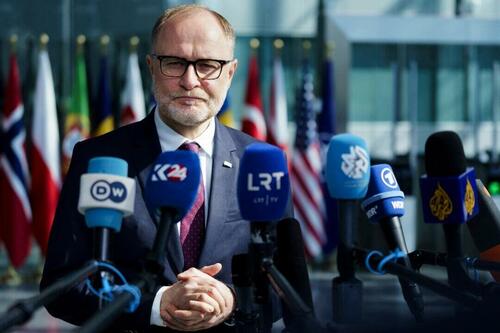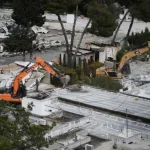
Authored by Andrew Thornebrooke via The Epoch Times,
The nations on NATO’s easternmost flank are investing record amounts on defense in order to deter further Russian aggression against the region.
Defense ministers from Estonia, Latvia, and Lithuania gathered on July 9 in Washington to express their dedication to the NATO alliance and encourage other allies to pull their weight when it came to defense contributions.
Anything less, they warned, could encourage more violence in Eastern Europe and, possibly, the end of some nations outright.
Latvia's Minister of Defense Andris Spruds delivers a doorstep statement during a meeting of NATO Ministers of Defense at the NATO Headquarters in Brussels on June 13, 2024. (Simon Wohlfahrt/AFP via Getty Images)
Latvian Defense Minister Andris Spruds said that Russian President Vladimir Putin’s continued targeting of civilians in Ukraine demonstrated a tolerance for “human loss.” Mr. Putin’s “absolute disregard of human life and human dignity,” he said, had to be taken into account when dealing with Russia.
“We are dealing with an aggressive country,” he said during a fireside chat hosted by Politico on the sidelines of NATO’s 75th annual summit.
“Russia is an existential threat, and we should be ready for this existential threat for years.”
To that end, he added, the international community should prepare to fend off Russian aggression for years to come.
It was vital, he said, that NATO “not engage from positions of weakness and appeasement.”
Estonia, Latvia, and Lithuania were all governed by the Soviet Union until its collapse in 1991.
Now, Mr. Putin has implemented a foreign policy based on uniting the so-called Russian World, including substantial Russian-speaking communities in former Soviet states, which East European leaders fear will lead to conquests beyond Ukraine.
As such, Estonia, Latvia, and Lithuania have all exceeded NATO’s guideline of spending 2 percent of their GDP on defense to ensure collective deterrence against foreign aggression.
Lithuanian National Defense Minister Laurynas Kasciunas said the investments were about “transforming the fear to preparedness.”
Mr. Kasciunas cited the Reagan-era doctrine of “peace through strength” and said that NATO should be “prepared to work with America” to ensure such a policy regardless of the outcome of the U.S. presidential election in November.
“Russians are not attacking when you’re strong. It’s a very simple thing. If you’re weak, they can do this,” he said.
Six NATO nations share a land border with Russian territory, a fact that Estonian Defense Minister Hanno Pevkur said would need to be taken into account when determining NATO’s pathway toward ensuring continued deterrence against Russian aggression.
“When we take the threat of Russia, the first thing we have to understand is that we cannot change the geography,” Mr. Pevkur said.
To that end, he added that NATO must be wholly prepared to engage in a war with Russia should Moscow attack any member state.
“We will start defending our countries from the first inch,” Mr. Pevkur said. “We will not keep away anything, and if that means that we also have to make attacks into Russian territory, then we are ready for that because we cannot fight only on our territory to keep every inch of our integrity.”
Authored by Andrew Thornebrooke via The Epoch Times,
The nations on NATO’s easternmost flank are investing record amounts on defense in order to deter further Russian aggression against the region.
Defense ministers from Estonia, Latvia, and Lithuania gathered on July 9 in Washington to express their dedication to the NATO alliance and encourage other allies to pull their weight when it came to defense contributions.
Anything less, they warned, could encourage more violence in Eastern Europe and, possibly, the end of some nations outright.
Latvia’s Minister of Defense Andris Spruds delivers a doorstep statement during a meeting of NATO Ministers of Defense at the NATO Headquarters in Brussels on June 13, 2024. (Simon Wohlfahrt/AFP via Getty Images)
Latvian Defense Minister Andris Spruds said that Russian President Vladimir Putin’s continued targeting of civilians in Ukraine demonstrated a tolerance for “human loss.” Mr. Putin’s “absolute disregard of human life and human dignity,” he said, had to be taken into account when dealing with Russia.
“We are dealing with an aggressive country,” he said during a fireside chat hosted by Politico on the sidelines of NATO’s 75th annual summit.
“Russia is an existential threat, and we should be ready for this existential threat for years.”
To that end, he added, the international community should prepare to fend off Russian aggression for years to come.
It was vital, he said, that NATO “not engage from positions of weakness and appeasement.”
Estonia, Latvia, and Lithuania were all governed by the Soviet Union until its collapse in 1991.
Now, Mr. Putin has implemented a foreign policy based on uniting the so-called Russian World, including substantial Russian-speaking communities in former Soviet states, which East European leaders fear will lead to conquests beyond Ukraine.
As such, Estonia, Latvia, and Lithuania have all exceeded NATO’s guideline of spending 2 percent of their GDP on defense to ensure collective deterrence against foreign aggression.
Lithuanian National Defense Minister Laurynas Kasciunas said the investments were about “transforming the fear to preparedness.”
Mr. Kasciunas cited the Reagan-era doctrine of “peace through strength” and said that NATO should be “prepared to work with America” to ensure such a policy regardless of the outcome of the U.S. presidential election in November.
“Russians are not attacking when you’re strong. It’s a very simple thing. If you’re weak, they can do this,” he said.
Six NATO nations share a land border with Russian territory, a fact that Estonian Defense Minister Hanno Pevkur said would need to be taken into account when determining NATO’s pathway toward ensuring continued deterrence against Russian aggression.
“When we take the threat of Russia, the first thing we have to understand is that we cannot change the geography,” Mr. Pevkur said.
To that end, he added that NATO must be wholly prepared to engage in a war with Russia should Moscow attack any member state.
“We will start defending our countries from the first inch,” Mr. Pevkur said. “We will not keep away anything, and if that means that we also have to make attacks into Russian territory, then we are ready for that because we cannot fight only on our territory to keep every inch of our integrity.”
Loading…





